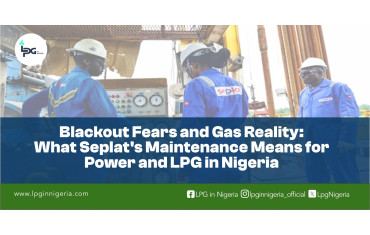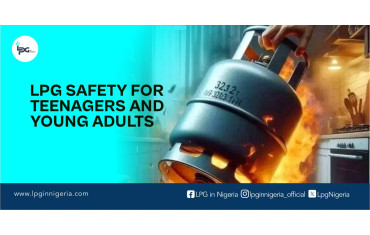- 5068
- 1
Sharing Ideas and Updates on LPG in Nigeria and related information to enable effective collaboration within the LPG Value Chain
What Exactly Is Butane Gas, And Where Is It Obtainable Within Nigeria?

The Foundation of Butane Gas
Butane gas, a hydrocarbon gas that is both colourless and odourless, possesses a remarkable array of commercial and industrial applications. Its versatile nature, coupled with its affordability, renewability, and non-toxic properties, has propelled it to the forefront of energy solutions. Butane gas is a prominent member of the Liquefied Petroleum Gas (LPG) family. Its popularity stems from its unique combination of attributes, making it an indispensable resource in Nigeria. Butane gas is primarily used as a fuel for cigarette lighters, camping stoves, torches, and other flame-based devices because of its high heat value. It is also used as an aerosol propellant in deodorants and hair sprays because of its ability to quickly evaporate without leaving behind any residue. Further, butane gas is also used as an anesthetic due to its properties as an anesthetic agent with a quicker recovery time than other types of anesthesia. This article explores the multifaceted applications of butane gas in Nigeria, shedding light on its pivotal role in various sectors.
Cost-Effectiveness: Butane gas is known for being economically viable, making it accessible to a wide range of consumers across different income brackets.
Renewable Source: Being a byproduct of crude oil refining and natural gas processing, butane gas is inherently renewable, contributing to sustainable energy practices.
Non-Toxic Nature: Its non-toxic properties make it a safe choice for various applications, including those involving direct human contact.
Difference between Propane and Butane
Butane and propane are hydrocarbon gases belonging to the LPG family. Butane consists of four carbon atoms and ten hydrogen atoms, while propane contains three carbon atoms and eight hydrogen atoms. The variation in their molecular structures results in different physical properties. Butane is a highly flammable gas with a boiling point of approximately -1°C (30°F), making it suitable for use in warmer climates. On the other hand, propane has a lower boiling point of -42°C (-44°F), rendering it ideal for colder environments.
Sustainable Practices and Precautions
LPG is highly flammable and potentially hazardous. Adhering to safety precautions is paramount:
Regular Inspection: Regularly inspect cylinders for signs of damage, rust, or corrosion. Replace damaged cylinders promptly.
No DIY Repairs: Never attempt to repair a damaged cylinder yourself. Contact a professional for repairs or replacement.
Use Proper Regulators: Ensure that you are using the correct regulator for your cylinder. Incorrect regulators can lead to gas leaks and accidents.
Leak Detection: Familiarize yourself with the smell of LPG (it has a distinctive odor) and learn how to detect gas leaks. If you suspect a leak, turn off the cylinder and ventilate the area immediately. Do not use electrical switches or devices that could cause a spark.
Fire Safety: Keep a fire extinguisher in the vicinity of the cylinder storage area. Additionally, educate household members about fire safety measures.
Advancements in Food Preservation: Harnessing the Power of Butane Gas
Food preservation stands as a cornerstone of sustainable living, and in Nigeria, the utilization of butane gas as a preserving agent has been gaining prominence. This inert gas boasts qualities that make it an ideal choice for maintaining the freshness and quality of edibles over time. The process itself involves a systematic approach, revolutionizing the way perishable items are stored and conserved.
The Chemistry Behind Butane Gas Preservation
Butane gas takes center stage in food preservation due to its non-reactive nature. It remains unaffected by other substances, ensuring that the preserved food maintains its original taste and aroma. Unlike some preservation methods that leave behind chemical residues, butane gas leaves no trace, allowing the true essence of the food to shine through. This innovative technique involves encapsulating the food within high-density polyethylene bags. These bags are hermetically sealed and placed within a specialized metal canister containing butane gas. This sealed unit is then stored in a refrigerated environment, typically maintained between 1°C and 7°C, which effectively thwarts the growth of harmful bacteria.
Anaerobic Bliss: The Science of Preservation
The heart of this preservation process lies in the transition to an anaerobic environment. As the butane gas slowly diffuses into the food-packed bags, it displaces the oxygen, creating an atmosphere that hampers the growth of spoilage-causing microorganisms. This anaerobic state prevents the deterioration of the food, ensuring it remains edible for extended periods.
Urbanization and the Need for Space-Efficient Solutions
The rapid urbanization of Nigeria has brought forth unique challenges, including the need for efficient food preservation methods that don't require excessive space. Butane gas preservation has emerged as a beacon in this context. Its versatility eliminates the necessity for additional equipment or intricate infrastructure. An additional advantage lies in its independence from refrigeration, allowing it to flourish even in settings without access to consistent cooling facilities. Moreover, this technique maintains the food's sensory qualities, keeping its taste and aroma unaltered.
Butane Gas: Transforming the Commercial Landscape
The advantages of butane gas extend beyond food preservation. It serves as a clean-burning alternative to propane, finding application in various industries, from food processing to waste management and construction. Particularly in areas with high population density, its non-explosive and odorless properties make it a safe choice. The fluidity of butane gas allows seamless transportation through large-diameter pipes, accommodating a spectrum of equipment designed for liquid fuels. Notably, its logistical ease sets it apart from propane, which necessitates specialized storage mechanisms due to its gaseous state. As Nigeria's demand for propane surges, butane gas emerges as an increasingly vital alternative for both its practicality and ecological benefits.
Revolutionizing Culinary Techniques: Exhaust Frying with Butane Gas
In the culinary realm, butane gas has sparked innovation in the form of exhaust frying. This method employs the combustion of butane gas within a cylindrical vessel to generate heat for cooking. Vertical tubes within the vessel facilitate the controlled flow of butane gas, ensuring thorough heating and even cooking. Exhaust frying is not only cost-effective but also environmentally friendly, as it produces no toxic residues. Its portability and adaptability to various cooking scenarios, both residential and commercial, position it as a forward-looking approach in the culinary world.
Where to Purchase Butane Gas in Nigeria
Our LPG in Nigeria marketplace is a very good place to make your purchase for Butane at affordable prices. Many of the sellers on our platforms are properly vetted and will make the purchase seamless for you. Click here to view our sellers.
In addition to the verified and credible sellers available on our LPG in Nigeria marketplace, we've also curated a list of sellers that we've come across online. It's important to note that we have no formal affiliations with these independent sellers. If you decide to engage in business transactions with them, we strongly advise conducting thorough research and ensuring their credibility, as we cannot assume responsibility for any unfavorable outcomes. To explore some of the sellers we've identified across Nigeria, please feel free to click here.
The transformative potential of butane gas in food preservation, industrial applications, and culinary techniques is undeniable. Its non-reactive nature, coupled with its anaerobic preservation capabilities, offers a promising solution to the challenges of food spoilage and waste. As Nigeria progresses into an era marked by urbanization and increasing demands, butane gas stands as an adaptable and environmentally conscious ally, paving the way for efficient, sustainable, and innovative practices across various sectors.
















Stills Karthick
11 March 2025 - 07:36amExcellent guide
Reply